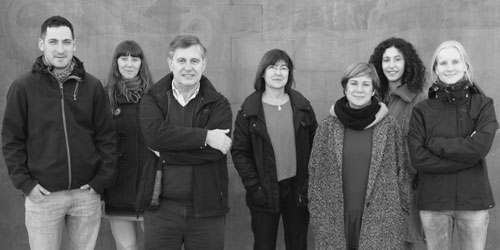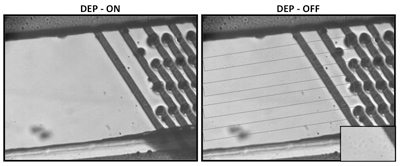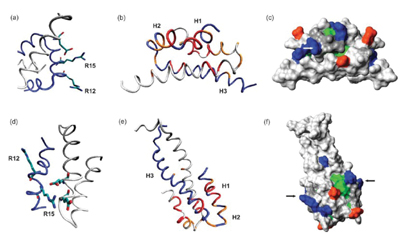
Description

Protein–protein and protein–DNA interactions play key roles in the ability of virulent bacteria to adapt to the host environment and cause disease. A group of proteins is currently the focus of our research: nucleoid-associated proteins (NAPs) that contribute to DNA architecture and modulate gene expression. We are interested in unravelling the role played by two of these proteins – Hha and H-NS – in the regulation of virulence and of plasmid transfer. Escherichia coli pathotypes such as enteroaggregative E. coli are the subject of our research. Owing to their key modulatory functions, these proteins are interesting targets to combat bacterial infections. 2. Bacterial plasmids and their role in transmission of multidrug resistance markers A main concern with bacterial infections is the selection of isolates that are resistant to several antimicrobial drugs. The transmission of the ability of bacterial cells of simultaneously resist several antimicrobial drugs is accomplished, in many instances, by plasmids. These genetic elements can be transmitted from one cell to another, and modify the phenotype of the recipient cell. We have recently shown that multidrug resistance plasmids in Salmonella require specific plasmid proteins to be stably maintained in this microorganism. These proteins could be considered as targets to combat multidrug resistance. 3. Application of nanotools of bacterial biotechnology

3.1. Dielectrophoresis. We have previously shown that dielectrophoresis can be a valuable tool for bacterial cell sorting and characterization. We are currently using different chip designs (2D and 3D carbon electrodes) to: a) study the effect of electric fields on bacterial cell physiology; b) combine DEP with other molecular protocols for detection and identification of different types of cells. Recent results have shown that DEP chips can be used to increase PCR detection of yeast cells. 3.2. Atomic force microscopy (AFM). Conventional AFM approaches have been shown to be powerful techniques for characterizing both biomaterials and biomolecules. In a joint project with the Nanoscale Bioelectrical Characterization group (page 76), we intend to use electrical- AFM to characterize the bacterial cell envelope. We also plan to use this approach to analyze the structural and physiological properties of bacterial living cells.
News/Jobs
IBEC internal collaboration succeeds in measuring bacterial cell response to electrical fields
17/09/14
Two groups working together at IBEC demonstrate the potential of electrical studies of single bacterial cells in a paper published in ACS Nano. Gabriel Gomila’s Nanoscale Bioelectrical Characterization group and that of Antonio Juárez, Microbial Biotechnology and Host-pathogen Interaction, combined their expertise on microscopic electrical measurements and bacteria respectively to come up with a way to study the response to external electrical fields of just a single bacterial cell.
Antibiotic resistance: a ‘devastating’ public health issue
27/11/2013
A researcher’s paper published in the journal Environmental Microbiology is just one step in the right direction to tackle a major public health issue that he and other experts say could soon be devastating.
«El combate contra la pseudomona en manos del Dr. Torrents»
27/09/2012
Senior researcher Eduard Torrents appears several times in the July edition of the newspaper of the Associació Catalana de Fibrosi Quística, Per a Vèncer la Fibrosi Quística.
Continuing the fight against cystic fibrosis
03/05/2012
IBEC Senior Researcher Eduard Torrents participated in a conference to mark the National Day for Cystic Fibrosis last Wednesday 25 April. This event, which took place at the Spanish Society of Pneumology and Thoracic Surgery (SEPAR), also included the official presentation of funds from the Associació Catalana de Fibrosis Quística (Catalan Association of Cystic Fibrosis) to research groups specializing in the disease.
Joining forces to beat Salmonella
13/06/2011
An IBEC group has embarked on a technology transfer venture together with two biopharmaceutical companies. Antonio Juárez’s Microbial Technology and Host-Pathogen Interaction lab has formed a consortium with CZV Veterinaria, a leader in the manufacture of veterinary products based in Porriño, Galicia, and Valls Companys’ pharmaceutical arm MEVET in Lleida. Their two-year project aims to obtain strains of Salmonella with weakened virulence, which can then be used to develop a vaccine to reduce the incidence of the infection in poultry farms. Salmonella, a leading cause of food poisoning, is zoonotic, able to spread to man through contaminated animal food products.
Opening new doors to combat bacterial infections
26/04/2011
We may be several steps closer to understanding one of the major pathologies that affects sufferers of cystic fibrosis, thanks to Senior researcher Eduard Torrents of IBEC’s Microbial biotechnology and host-pathogen interaction group
IBEC researcher receives Pablo Motos award
12/01/2011
Eduard Torrents, senior researcher in IBEC’s Microbial Biotechnology and Host-pathogen Interaction group, has been announced as a recipient of the 2010 Pablo Motos award from the Federación Española de Fibrosis Quística (Spanish Association of Cystic Fibrosis) this week.
IBEC to host Sociedad Española de Microbiología group congress
08/11/2010
This week IBEC will be hosting the 8th meeting of the Molecular Microbiology group of the Sociedad Española de Microbiología (SEM). The congress will offer the chance for participants to learn about noteworthy advances in the field and to discuss the particular trends and challenges in this area.
Discovery of the key to the success of some of the most virulent bacteria
02/07/2009
Researchers at IBEC, IRB Barcelona and the UB identify the strategy used by enterobacteria to acquire resistance and pathogenicity.
The Cystic Fibrosis Association of Catalonia supports research study at IBEC
17/06/2009
The Cystic Fibrosis Association of Catalonia (Asociación Catalana de Fibrosis Quística) provides active support to the research conducted by Doctor Eduard Torrents, a member of IBEC´s Microbial Biotechnology and Host-Pathogen Interaction Group, into the enzyme that promotes the growth of the bacteria linked to this disease.
Projects
National projects
| Regulación de la virulencia bacteriana por proteínas que reconocen conformaciones locales del ADN | REGVIRBAC | Antonio Juárez |
| INTERMODS Interconexiones de Módulos plasmídicos y los Genomas de Bacterias Patógenas | MINECO-CSIC | Antonio Juárez (managed by UB) |
Privately funded projects
| MEJORAVE1 Mejora sanitaria y de productos cármicos de ave | Industrial project with Mevet, S.A – CZ Veterinaria, S.A | Antonio Juárez |
Publications
Equipment
- Dielectrophoresis equipment
- Thermocycler (PCR)
- Protein and DNA electrophoresis
- Process of biomolecule production
- Protein expression and purification systems
- Technology of microbial culture facilities
Collaborations
- Prof. Charles Dorman Trinity College, Dublin
- Dr. Eduard Torrents IBEC
- Dr. Rodrigo Martínez-Duarte École Polytechnique Fédérale de Lausanne
- Prof. Josep Casadesús Universidad de Sevilla
- Prof. F. García del Portillo Centro Nacional de Biotecnología, Madrid
- Dr. Gabriel Gomila IBEC
- Prof. Mike Hughes University of Surrey (UK)
- Prof. Josep Samitier IBEC
- Prof. Miquel Pons Organic Chemistry Dept., University of Barcelona, Spain

